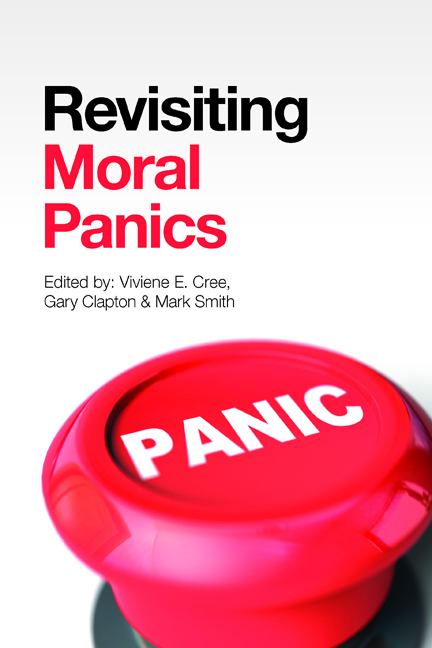Book contents
- Frontmatter
- Contents
- Contributors
- Preface
- Commentary moral panics yesterday, today and tomorrow
- Part One Gender and the family
- Part Two Moral panics in our time? Childhood and youth
- Part Three The state, government and citizens
- Part Four Moral crusades, moral regulation and morality
- Afterword the moral in moral panics
- Conclusion Moral panics and beyond
- Index
Five - Amoral panic: the fall of the autonomous family and the rise of ‘early intervention’
Published online by Cambridge University Press: 08 March 2022
- Frontmatter
- Contents
- Contributors
- Preface
- Commentary moral panics yesterday, today and tomorrow
- Part One Gender and the family
- Part Two Moral panics in our time? Childhood and youth
- Part Three The state, government and citizens
- Part Four Moral crusades, moral regulation and morality
- Afterword the moral in moral panics
- Conclusion Moral panics and beyond
- Index
Summary
Introduction
In 2008, I suggested that the concept ‘moral panic’ was, in many respects, past its ‘sell-by’ date; the idea of amoral panic was offered as an alternative (Waiton, 2008). My analysis was based on the following observations:
• the use of morality is declining as a framework for panics
• the importance of amoral categories like ‘risk’ and ‘safety’ as central tenets of panics is growing
• individuals are engaged with as diminished subjects
• old ‘moral’ institutions are undermined rather than shored up by these panics
• ‘panics’ are normalised and institutionalised.
In this chapter, I will take this argument further by examining the transformation that has been taking place in ‘The Family’, an institution once central to moral panic theorising, associated with moral values and understood and defended as something that was ‘at the heart of society’ (Goode and Ben-Yehuda, 1994, p 8). I pose the question: to what extent is the ‘future of the nuclear family’ the basis for panics today (Cohen, 2011, p xxii)? In particular, I look at the way the idea of the ‘autonomous family’ has all but disappeared from government and policy discussions of the family, and conclude by suggesting that we need to understand the rise and rise of ‘early intervention’ policies and initiatives as an illustration of the amoral panic that has developed around the family in the 21st century.
The rise and rise of ‘early intervention’
The opening sentence of the UK government's document Next Steps for EarlyLearning and Child Care, published in 2009, reads: ‘Everyone agrees that the first few months and years are the most important in a child's life.’ The document goes on to explain that it is a child's mother and father that bring up a child – not governments & ; but then adds: ‘but parents need support’ (Department for Children, Schools and Families, 2009, p 3). This is just one of a plethora of documents that have been produced in recent years exploring the issue of intervention, early intervention and ‘support’ for families.
This mass of documents is further supported by various reports looking specifically at the issue of early intervention, one of the most noticeable being Early Intervention: Good Parents, Great Kids, Better Citizens (2008), written jointly by the Labour MP Graham Allen and the Conservative MP Iain Duncan Smith.
- Type
- Chapter
- Information
- Revisiting Moral Panics , pp. 49 - 58Publisher: Bristol University PressPrint publication year: 2015



